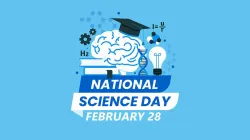National Science Day 2024: The story of Raman effect, theme, importance, and events | All details here
National Science Day is a special day in India to celebrate a discovery called the Raman Effect. It's named after a scientist named Chandrasekhara Venkata Raman.

Every year on February 28, India observes National Science Day to commemorate the groundbreaking discovery made by Indian scientist Chandrasekhara Venkata Raman in 1928. Raman discovered the phenomenon of the scattering of photons, which was later named the 'Raman Effect' in his honour. This discovery earned him the Nobel Prize in Science in 1930.
What is the Raman Effect
The Raman Effect, as explained by the Ministry of Culture, is a phenomenon in spectroscopy where photons are scattered by excited molecules at higher energy levels. In simpler terms, it refers to the change in the wavelength of light when it is deflected by molecules.
Significance of National Science Day
National Science Day serves multiple purposes. It aims to raise awareness about the importance of scientific applications in daily life, acknowledge achievements in the field of science, discuss relevant issues, and introduce new technologies for scientific development. Additionally, it provides a platform for science enthusiasts to engage in discussions and promotes the popularisation of science and technology.
The theme for National Science Day 2024
Each year, National Science Day adopts a specific theme. The theme for 2024 is 'Indigenous Technologies for Viksit Bharat', highlighting the importance of utilising homegrown technologies for the advancement of the nation.
History and origin
The idea of National Science Day was proposed by the National Council for Science and Technology Communication (NCSTC) in 1986. Following their recommendation, the Government of India officially declared February 28 as National Science Day. The inaugural celebration took place on February 28, 1987, marking the beginning of an annual tradition to honour scientific achievements and promote scientific temperament across the country.
Celebrations and activities
On National Science Day, educational institutions, research organisations, and scientific communities organise various events such as quiz competitions, seminars, and workshops to engage students and the public in scientific discourse and promote a culture of scientific inquiry and innovation.
ALSO READ | Elon Musk calls out Microsoft CEO for Windows setup issue | What you need to know
ALSO READ | MWC 2024: Day 1 highlights - Notable launches and our top picks
